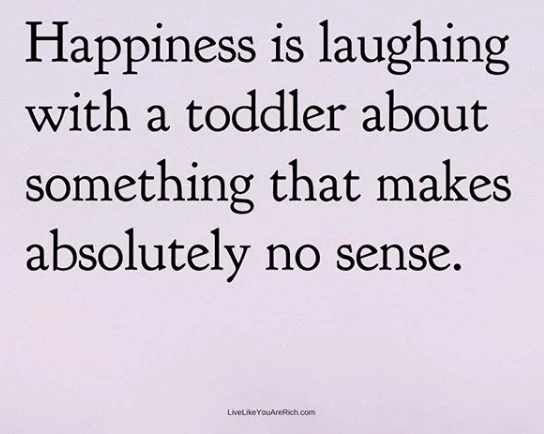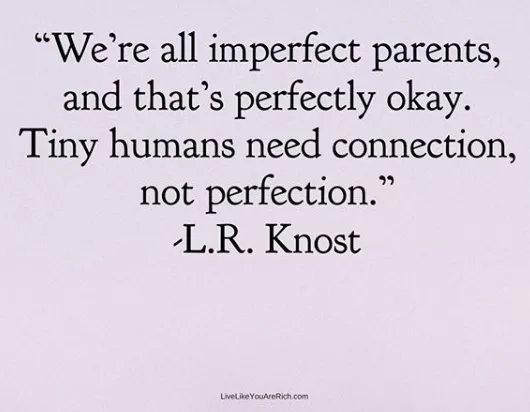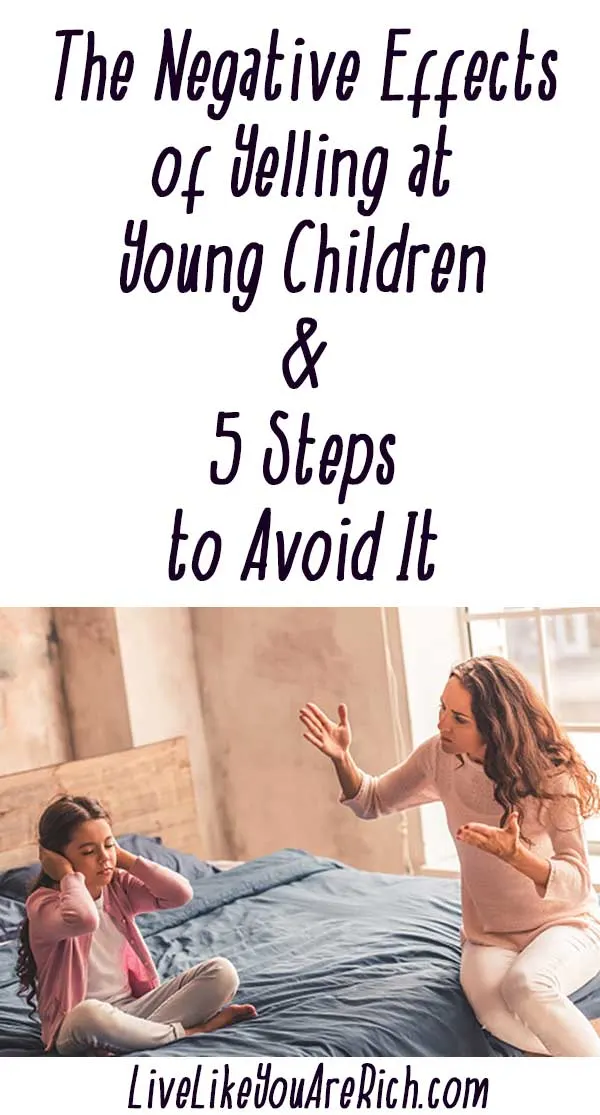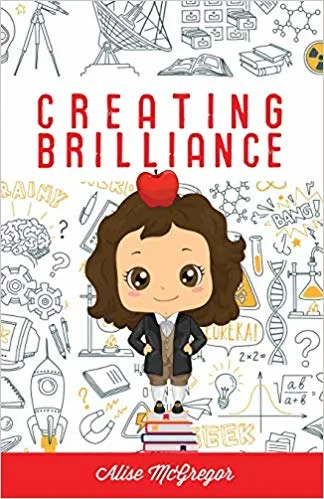Alise, a guest expert, and I explain The Negative Effects of Yelling at Young Children & 5 Steps to Avoid It.
I, Anita, love being a mom. It is my favorite role and job I have ever had. I thank God every day for my children. They are so fun, cute, sweet, and unique.
We laugh, play, read, learn, go places, and experience new things together every day. My children bring me so much of the joy I derive from life!
I love this quote, “Happiness is laughing with a toddler about something that makes absolutely no sense.” because it is very true in our family!

Yet, sometimes parenthood can be downright difficult! We all have those days that seem like everything we want to get done, not only is not getting done but we are on the fast-track backwards on our never-ending list of tasks.
Days are especially tough when you or your kids or everyone is sick.
Moments get stressful when the kids don’t stop arguing with each other, are interrupting an important conversation, etc. These tough moments and days try even the most patient of parents.
Parenting children can be tough and none of us are perfect. None of us are 100% composed all of the time.
I like what L. R. Knost said, “We’re all imperfect parents, and that’s perfectly okay. Tiny humans need connection, not perfection.”

Yet we want our kids to know of our love for them, to grow up with self-confidence, and to see productive appropriate ways of dealing with stress.
In time, we want them to become good parents too. A lot of who they become depends on our examples as their parents. We can and should do our best to improve our parenting abilities.
It is saddening to me when I see parents who often scream at their kids, call them names, and use harsh tones with their kids. I have seen the negative effect it has on children.
It is okay to use stern tones or even yell at times—to help kids avoid danger (i.e. when they are about to touch a hot stove), but yelling at our kids often and for non-threatening things is something we as parents should be striving not to do.
Why you may ask? I turn to Alise McGregor to address the Whys and Hows. These tips can help all of us parents discipline our little children in more effective and healthy ways.
Alise McGregor, is the founder of Little Newtons. Welcome Alise,
When children are yelled at, their bodies are wired to turn on the “fight or flight” biological reaction as they think they are in danger.
A real life example is a 2 year old running into a busy street and her mom yells her name. The response is usually the child freezes and feels scared but the result is hopefully they are saved from danger.
A different real life example is when the same child tips over their milk at dinner and the parent yells at her. Her heart and breathing increases and her body feels stress. Two real life examples, but very different situations.
How often do children do things like spill their milk, not get ready in time, not listen for the 47th time?
They do these things on a daily basis.
Thus, it is imperative that we restrict this “fight or flight” response to the times when it is crucial to keep them safe.
Yelling at children on a regular basis teaches them to yell or be aggressive with others. Children are mimics and they watch what adults around them do. So if we walk around yelling, they will think that is the best way to handle conflict.
During their early years of life their brains and emotions are developing rapidly, in order to build strong adults, we need to build strong children.
Building up their confidence, self esteem, self worth, etc. is done by positive reinforcement which is the opposite of yelling.
Young children need to feel that while they make mistakes, they are learning how the world works and its Okay.
“During their early years of life, a child’s brain and emotions are developing rapidly; in order to build strong adults, we need to build strong children.”
Yelling breaks down the bond between the adult and child. It makes the child fear the adult and it does not allow the child to fully develop their brain to handle conflict, seek support when needed (times of stress) and feel loved.
Being afraid of spilling their milk is not a healthy situation for a child. It causes anxiety for meal time.
They shouldn’t be afraid to make mistakes that will not harm them and the people around them.
However, they should be afraid to touch the stove because that is physically harmful, or afraid to run into traffic because that is dangerous.
So what do we as adults do in order to avoid yelling?
Adults can use these five strategies first before resorting to yelling
-
Count to 10 and/or take a few moments to settle yourself before reacting.
Take a breather and reset. Then calmly talk about how you feel with your child. “When I ask you do something and you don’t do it, I feel frustrated.”
Explaining to them what you are feeling teaches them that they can be transparent about their own feelings as well.
-
Give your kids options every day.
Giving kids options is a great way to give them more control and to feel less powerless.
This results in better behavior and results in less desire to yell on our part as parents.
“What pajamas are you going to wear tonight?”
“What do you want the pink cup or the purple?”
“Do you want a PBandJ or Tuna fish sandwich for lunch?”
“Would you like to make your bed or pick up toys?”
When children have options and choices they won’t resent our rules as much and they will disobey less.
-
Rephrase ‘no commands’ into ‘positive commands’.
In the sequence of development, learning language and commands, children don’t process a “no command” quite the same way adults do.
When you say “don’t run” they first hear “run.” When you say “stop climbing on that” they process “climb on that” before they process the word stop.
We need to work to rephrase ‘no commands’ into ‘positive commands’.
It is certainly a hard thing to switch the way to give commands on the drop of a dime.
Using different language like “use your walking feet” instead of “don’t run” or “feet on the floor” instead of don’t climb on that can take awhile to get the hang of, but its worth the effort.
These positive commands have been proven to be more effective for young children.
Asking questions is another great way to remain positive and avoid negative commands. “What do we do to get ready for bed?” “What do we do when we have an empty cup?”
-
Teach them the Why’s
Just like we adults want to know the explanation behind rules, research, etc. so do kids. Taking the time to teach them why you set certain rules strengthens their problem solving abilities and helps them to understand the importance of each rule.
You can tell them not to touch the kitchen knifes, but you will have better results if you tell them why they shouldn’t. “If you touch the knifes you can get cut and hurt.” Or “If you climb on that it will break and you will get hurt.”
“Use your quiet voices because we are in a restaurant and the people around us want to be able to hear each other as much as you want to be able to be heard.”
-
Have consequences that can be easily carried out.
This way when you are frustrated due to the child not listening, breaking rules, etc. you can enforce the consequence and then take a breather.
Time outs, extra chores to do around the house, chart for misbehavior, etc. are a great way to discipline when children do not follow rules.
Apologize when you yell needlessly
When you make the mistake of yelling about something non-life threatening, be sure to apologize. This will teach them that if they loose their cool at someone else they should apologize as well.
I hope that by understanding the negative effects that yelling has on young children and working on these 5 strategies to avoid it, it will help us become better parents.
Thank you, Alise!
Alise McGregor is the founder of Little Newtons (www.littlenewtons.com), an exceptional child care center focusing on early childhood education with four locations in Minnesota and one in Illinois. She is the author of the book, Creating Brilliance.

For other ‘rich living tips’ please subscribe, like me on Facebook, and follow me on Pinterest and Instagram.

SUBSCRIBE FOR OUR EMAILS



Amy @ Geniani
Thursday 23rd of May 2019
I totally agree! Therefore, I am in love with positive parenting. You shouldn't yell at your children. Try to build a warm relationship and you will find the key to happiness. We should understand that our child (even if it is so young) is a personality. So, respect them and try to teach how to be a good person in this world. It is the goal for every parent.